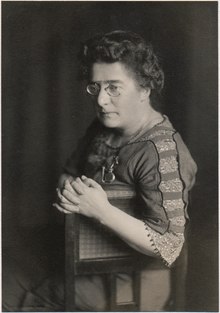Adeline Rittershaus-Bjarnason
Adeline Rittershaus-Bjarnason (born July 29, 1876 in Barmen (now part of Wuppertal ), † September 6, 1924 in Berlin ) was a German philologist , Germanist and champion for equal rights for women. She was one of the first women to do her doctorate at the University of Zurich in 1898 and in 1902 was the first woman to acquire a Venia legendi at the Philosophical Faculty I of the University of Zurich. Her most famous writing is a collection of Icelandic folk tales .
Life
Adeline Rittershaus was a daughter of the poet Emil Rittershaus and grew up in Barmen in the Prussian Rhine Province . Ferdinand Freiligrath , a friend of her father's, was her godfather . For her part, Adeline Ritterhaus was a great godmother and godmother of the pollster Elisabeth Noelle-Neumann .
Since women in Germany could only acquire the Abitur from 1899 , Adeline Rittershaus passed the Matura examination in Zurich in 1894 after private preparation by teachers at the Barmer Realgymnasium . She then studied Germanic philology at the University of Zurich with Albert Bachmann, among others, and learned Greek and Sanskrit . She was one of the first women to do her doctorate at the University of Zurich in 1898 with a study of the expressions for facial sensations in the old Germanic dialects .
In 1898 she traveled to Iceland for the first time for several months to study the Icelandic language and literature. After her return to Zurich, she continued this course intensively with a study of Old and New Icelandic. During her second stay in Iceland in 1899, Adeline Rittershaus met the Icelandic teacher Thorleifur Bjarnason and married him. The divorce took place just a year later.
In 1901 she submitted an application for admission to the Habilitation for Old and New Icelandic Language and Literature at the Rheinische Friedrich-Wilhelms-Universität Bonn , which was rejected with 14 to 16 votes. In the journal Frauencorrespondenz of February 11 and 14, 1902, Adeline Rittershaus reported in detail about her experiences with the University of Bonn. Until the end of the Empire, Adeline Rittershaus and Countess Maria von Linden were the only women in Prussia who had attempted to obtain a teaching license at a university. After the rejection of her habilitation application, Adeline Ritterhaus succeeded in doing her habilitation in 1902 with her book Die Neuisländischen Volksmärchen at the University of Zurich.
In 1904 she married the Zurich architect Theodor Oberländer from Germany ; this marriage was divorced in 1919, which increased the social pressure on them considerably. Due to a serious illness, she asked to be dismissed from the teaching staff at the University of Zurich on May 21, 1920. Adeline Rittershaus died of a heart attack in Berlin on September 6, 1924.
Research activity
At the National Library in Reykjavík , she researched Icelandic folk tales collected over the last century . From this activity her contribution to comparative fairy tale research, which is still important today, arose, her habilitation thesis Die Neuisländischen Volksmärchen . Her late work with the title Old Norse Women is a popular scientific portrait of women from the Viking Age , derived from saga poetry .
Fonts
- The expressions for facial sensations in the old Germanic dialects. A contribution to the history of meaning. Zurich 1899.
- Goals, paths and achievements of our girls' schools and proposal for a reform school. Jena 1901.
- New Icelandic folk tales. A contribution to comparative fairy tale research. Halle (Saale) 1902.
- Old Norse women. Frauenfeld / Leipzig 1917.
Quotes
“If we want to get to know the cultural point of view of a people exactly, then one of the most important questions is what position women have among this people; because the higher women are placed in morality and law, the higher the culture of this country is undoubtedly. "(Old Norse Women, 1917, p. 5)
Web links
- Literature by and about Adeline Rittershaus-Bjarnason in the catalog of the German National Library
- Andreas Bigger: Adeline Rittershaus. In: Historical Lexicon of Switzerland .
- Adeline Rittershaus in the uni-zürich magazine 4/95
- Women's history Uni Bonn: "Adeline Rittershaus-Bjarnason" ( Memento from June 11, 2007 in the Internet Archive )
Individual evidence
- ↑ Milestones in women's emancipation in Germany Article on focus.de
| personal data | |
|---|---|
| SURNAME | Knight's House Bjarnason, Adeline |
| ALTERNATIVE NAMES | Rittershaus, Adeline (maiden name); Rittershaus-Oberländer, Adeline (married name 1904–1919) |
| BRIEF DESCRIPTION | German philologist and Germanist |
| DATE OF BIRTH | July 29, 1876 |
| PLACE OF BIRTH | Barmen |
| DATE OF DEATH | September 6, 1924 |
| Place of death | Berlin |
